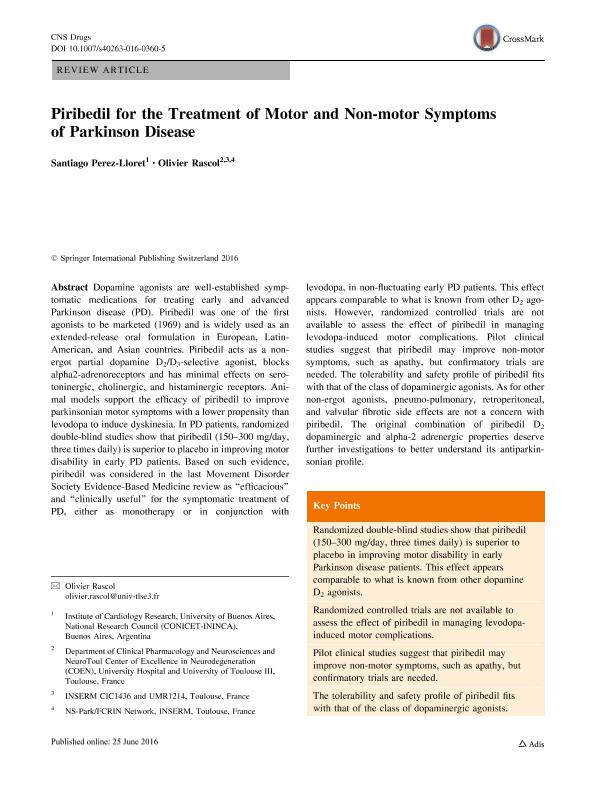Artículo
Piribedil for the Treatment of Motor and Non-motor Symptoms of Parkinson Disease
Fecha de publicación:
08/2016
Editorial:
Adis Int Ltd
Revista:
Cns Drugs
ISSN:
1172-7047
e-ISSN:
1179-1934
Idioma:
Inglés
Tipo de recurso:
Artículo publicado
Clasificación temática:
Resumen
Dopamine agonists are well-established symptomatic medications for treating early and advanced Parkinson disease (PD). Piribedil was one of the first agonists to be marketed (1969) and is widely used as an extended-release oral formulation in European, Latin-American, and Asian countries. Piribedil acts as a non-ergot partial dopamine D2/D3-selective agonist, blocks alpha2-adrenoreceptors and has minimal effects on serotoninergic, cholinergic, and histaminergic receptors. Animal models support the efficacy of piribedil to improve parkinsonian motor symptoms with a lower propensity than levodopa to induce dyskinesia. In PD patients, randomized double-blind studies show that piribedil (150–300 mg/day, three times daily) is superior to placebo in improving motor disability in early PD patients. Based on such evidence, piribedil was considered in the last Movement Disorder Society Evidence-Based Medicine review as “efficacious” and “clinically useful” for the symptomatic treatment of PD, either as monotherapy or in conjunction with levodopa, in non-fluctuating early PD patients. This effect appears comparable to what is known from other D2 agonists. However, randomized controlled trials are not available to assess the effect of piribedil in managing levodopa-induced motor complications. Pilot clinical studies suggest that piribedil may improve non-motor symptoms, such as apathy, but confirmatory trials are needed. The tolerability and safety profile of piribedil fits with that of the class of dopaminergic agonists. As for other non-ergot agonists, pneumo-pulmonary, retroperitoneal, and valvular fibrotic side effects are not a concern with piribedil. The original combination of piribedil D2 dopaminergic and alpha-2 adrenergic properties deserve further investigations to better understand its antiparkinsonian profile.
Palabras clave:
Parkinson'S Disease
,
Treatment
,
Dopamine Agonists
,
Piribedil
Archivos asociados
Licencia
Identificadores
Colecciones
Articulos(ININCA)
Articulos de INST.DE INVEST.CARDIOLOGICAS (I)
Articulos de INST.DE INVEST.CARDIOLOGICAS (I)
Citación
Pérez Lloret, Santiago; Rascol, Olivier; Piribedil for the Treatment of Motor and Non-motor Symptoms of Parkinson Disease; Adis Int Ltd; Cns Drugs; 30; 8; 8-2016; 703-717
Compartir
Altmétricas




